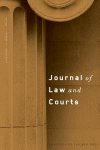 Maybe it’s just because my fingers are stained with ink, but the following story pleases me quite a bit.
Maybe it’s just because my fingers are stained with ink, but the following story pleases me quite a bit.
A new law review is being launched.
That sounds odd. Maybe I should explain my pleasure.
No, it’s not that a score more legal articles will populate the world every year (though that may be good news, depending on the articles). And it’s not that a thousand more footnotes will have the opportunity to join our already-footnote-laden world. (Once upon a time, I was senior managing editor on a law school journal, so I know whereof I speak. And I know how to use whereof.)
It is merely because a long-form style of writing, which actually requires something of the reader, will now be launched and have a chance to blossom (said the guy writing on his blog).
The Journal of Law and Courts will be published by The University of Chicago Press, which may have a corner on the “old-school intellectual” market.
Here is how the Press describes the new journal:
“Sponsored by the Law and Courts Organized Section of the American Political Science Association, JLC aims to be the premier journal for members of the law and courts intellectual community.”
 I could be crazy, but I think there’s a typo in there. Oh well, ink-stained wretches (even at the UofC) will do that on occasion.
I could be crazy, but I think there’s a typo in there. Oh well, ink-stained wretches (even at the UofC) will do that on occasion.
Besides enjoying actual writing by authors who think deeply, I also think the chosen topic is one that will provide much fertile ground to cover. As the publishers say,
“The peer-reviewed journal publishes scholarship that examines legal institutions, actors, processes, and policy. As an interdisciplinary journal, JLC is dedicated to combating intellectual fragmentation by promoting communication and fertilization across traditional boundaries.”
Who doesn’t support the battle against intellectual fragmentation? I know I do.
Here is what the inaugural issue will include:
- Gillian K. Hadfield and Barry R. Weingast, “Law without the State: Legal Attributes and the Coordination of Decentralized Collective Punishment”
- Ryan J. Owens, Justin Wedeking, and Patrick C. Wohlfarth, “How the Supreme Court Alters Opinion Language to Evade Congressional Review”
- Alec Stone Sweet and Thomas L. Brunell, “Trustee Courts and the Judicialization of International Regimes: The Politics of Majoritarian Activism in the European Convention on Human Rights, the European Union, and the World Trade Organization”
- Lawrence Baum, “Linking Issues to Ideology in the Supreme Court: The Takings Clause”
- Ward Farnsworth, Dustin Guzior, and Anup Malani, “Policy Preferences and Legal Interpretation”
- Peter F. Nardulli, Buddy Peyton, and Joseph Bajjalieh, “Conceptualizing and Measuring Rule of Law Constructs, 1850-2010”
The first issue (March) will be free to all. Subsequent issues, not so much. So if you also support thoughtful prose, head over to the Journal of Law and Courts site now.
Follow @azatty
Leave a comment